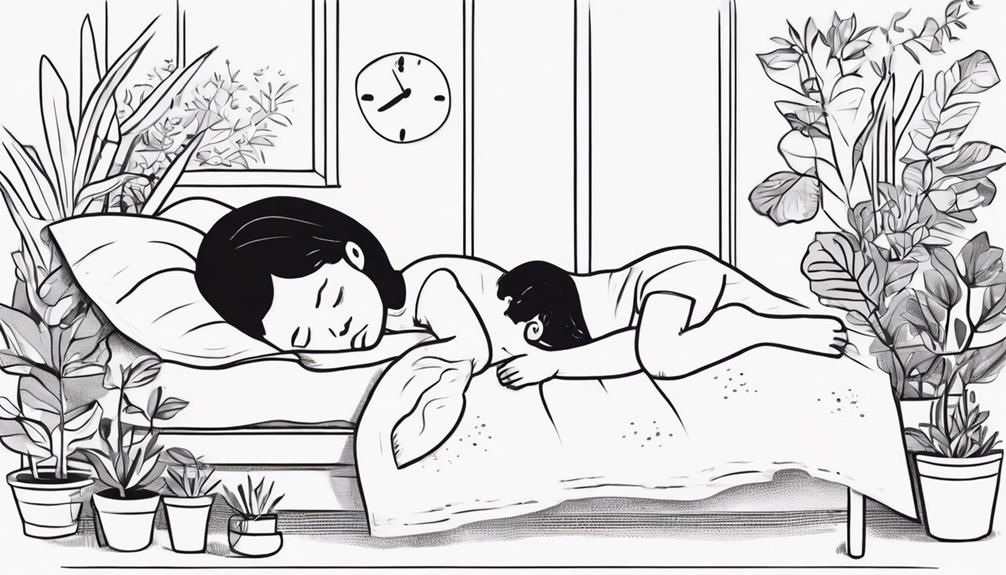As babies experience growth spurts, the necessity for increased sleep becomes paramount. The correlation between sleep and growth is not merely coincidental; rather, it is deeply rooted in the physiological processes that occur during slumber. Understanding the intricate mechanisms behind why sleep is crucial during growth spurts unveils a fascinating connection between rest and development. This relationship goes beyond mere restfulness; it delves into the very essence of how our bodies adapt and evolve during periods of rapid growth.
Key Takeaways
- Deep sleep is crucial for human growth hormone production, supporting physical and mental growth.
- Sleep is essential for brain development, regulating hormones and ensuring overall well-being.
- Adequate sleep directly influences cognitive and physical advancements during growth spurts.
- Quality sleep patterns during growth spurts maximize the body's growth potential and support intense development phases.
Importance of Sleep for Growth Spurts

During periods of growth spurts, the importance of sufficient sleep cannot be overstated, as it plays a crucial role in supporting the body's production of human growth hormone. Babies, specifically, produce human growth hormone primarily during deep sleep stages. This hormone is vital for physical growth, mental growth, and overall development. Increased sleep duration during growth spurts is essential to support the intense physical and mental growth that occurs during this period. Adequate sleep facilitates the body's process of growth and repair by releasing growth hormones. As infants undergo rapid changes and demands during growth spurts, good sleep becomes even more critical to help them cope effectively. Sleep is integral in aiding the body's growth and development, making it a fundamental component during growth spurts. By prioritizing sleep during these periods, babies can better navigate the significant growth and developmental milestones they experience.
Impact of Sleep on Development
Sleep plays a critical role in brain growth and development, especially during infancy and childhood. Adequate sleep supports the release of essential hormones that regulate various physiological processes, including growth and maturation. Understanding the impact of sleep on development is crucial for ensuring optimal growth and well-being in young children.
Sleep and Brain Growth
The relationship between adequate rest and brain growth is paramount, as it directly influences cognitive development during periods of growth spurts. Sleep plays a crucial role in the release of human growth hormone, which aids in babies' physical development. Deep sleep is particularly important as it supports the growth of both the body and the brain, contributing to cognitive and physical advancements. Babies require good quality sleep to sustain the rapid growth that occurs during growth spurts. Sleep deprivation can impede the body's optimal growth and development, underscoring the necessity of adequate rest during these periods. Furthermore, cognitive development during growth spurts may trigger changes in sleep patterns, reflecting the significant growth and maturation processes within the brain.
Hormones and Sleep
A critical interplay exists between hormonal regulation and sleep in shaping the developmental trajectory of individuals, particularly during periods of rapid growth and maturation. Sleep plays a vital role in facilitating the release of human growth hormone, which is essential for physical development, especially during growth spurts. Deep sleep is crucial as it supports both body and brain growth, necessary for intense development phases. Good sleep habits are particularly important for babies as adequate rest promotes the production of growth hormone, aiding in their growth. Therefore, during growth spurts, when the body undergoes significant changes, maintaining proper sleep patterns becomes crucial for ensuring the release of growth hormones required for optimal body growth and development.
Sleep Patterns During Growth Spurts

During growth spurts, infants exhibit distinct patterns of rest that coincide with heightened physiological development. Babies require increased sleep to support the release of human growth hormone, crucial for their physical growth. This extended rest period plays a vital role in facilitating effective growth and development of both their bodies and brains. Sleep is instrumental in the production of growth hormones that aid in the physiological changes occurring during these spurts. It is during these periods of intensified physical and mental growth, primarily transpiring during sleep, that babies make significant strides towards achieving developmental milestones. Adequate sleep during growth spurts is essential for babies to maximize their growth potential. Below is a table summarizing the relationship between sleep patterns and growth spurts:
| Aspects | Sleep Patterns During Growth Spurts |
|---|---|
| Hormone Release | Increased to support growth |
| Physiological Changes | Supported by adequate sleep |
| Developmental Milestones | Achieved through rest |
| Brain and Body Growth | Facilitated by extended sleep |
| Maximum Growth Potential | Linked to sufficient rest |
Relationship Between Sleep and Growth
The relationship between sleep and growth is fundamental, as deep sleep plays a crucial role in the release of growth hormones necessary for physical development. Increased sleep duration, including longer naps, often precedes measurable growth in babies, indicating a direct link between rest and growth. Understanding this interconnectedness can help in promoting optimal growth and development in infants during growth spurts.
Sleep Duration Impact
Sleep duration plays a crucial role in influencing the growth of babies, particularly during periods of rapid growth spurts. It is noted that infants experiencing growth spurts often exhibit increased sleep, including prolonged and increased napping. This extra rest is essential as infant growth in length follows periods of increased sleep, indicating a close relationship between sleep and physical development. Babies going through growth stages tend to sleep more before visible signs of rapid growth appear, suggesting that sleep patterns and growth are intricately connected. Furthermore, after intense growth phases, babies may require additional rest to recuperate and continue growing effectively. This highlights the significance of adequate sleep in supporting and optimizing growth spurts in infants.
Growth Hormone Release
Is there a direct correlation between the release of growth hormone and the duration and quality of sleep during growth spurts in infants? Deep sleep plays a crucial role in triggering the release of human growth hormone, which is essential for physical development. Here are four key points to consider:
- Growth Hormone Production: Peaks during the deepest stages of sleep, aiding in cellular growth and repair.
- Support for Body Growth: Sleep supports the body's ability to grow, repair tissues, and build muscle mass during growth spurts.
- Sleep Duration Impact: Increased sleep duration is linked to higher levels of growth hormone secretion, contributing to overall growth.
- Importance of Quality Sleep: Quality sleep during growth spurts is crucial for optimal physical growth, as the body undergoes significant changes.
Benefits of Adequate Sleep for Babies

Adequate sleep plays a critical role in promoting the optimal physical and cognitive development of babies during growth spurts. Babies require quality sleep to facilitate the release of human growth hormone, which is essential for their physical development. Deep sleep is particularly crucial as it supports the growth of both their bodies and brains, contributing significantly to their overall growth and development. During rapid growth phases, such as growth spurts, sufficient sleep becomes even more necessary to fuel the accelerated changes occurring in infants. Cognitive development also influences sleep patterns during these periods, underscoring the importance of good sleep quality for babies. Despite potential challenges in sleeping patterns during growth spurts, ensuring that babies receive adequate sleep is vital for their growth and well-being. Prioritizing sufficient and high-quality sleep for infants can lead to better outcomes in terms of their physical and cognitive development throughout periods of rapid growth and development.
Sleep Quality and Growth Spurts
During growth spurts, the correlation between sleep quality and physical development becomes increasingly evident. Quality sleep plays a vital role in supporting infants' growth spurts, impacting various aspects of their development:
- Release of Human Growth Hormone: Adequate sleep during growth spurts enhances the release of human growth hormone, which is crucial for physical development.
- Importance of Deep Sleep: Deep sleep is essential for infants as it aids in the efficient growth and regeneration of body tissues.
- Cell Repair and Growth: Sleep allows the body to repair and build new cells, which is essential for the overall growth process during growth spurts.
- Cognitive Development: Quality sleep is not only important for physical growth but also crucial for cognitive development and overall well-being, particularly during periods of rapid growth.
Ensuring infants get sufficient, high-quality sleep during growth spurts is essential to support their physical and cognitive development, as sleep plays a significant role in facilitating the processes necessary for their growth and overall well-being.
Consistency in Sleep During Growth Spurts

Maintaining a consistent sleep pattern is paramount for infants during growth spurts to support their optimal physical and cognitive development. In the first year of life, babies grow and experience rapid developmental leaps, necessitating increased sleep durations. Deep sleep is particularly crucial during these periods, as it is when the body releases human growth hormone, promoting physical development. Research suggests that babies tend to sleep longer as a precursor to measurable physical growth during growth spurts. Consistent and adequate sleep is essential for babies to recover from the intense physical and mental growth they undergo during these phases. By ensuring that infants have a steady sleep routine, parents can help facilitate the processes of tissue repair and regeneration that occur during deep sleep, ultimately aiding in the overall growth and development of their child.
Supporting Sleep Needs During Growth
To optimize a baby's growth and development during growth spurts, it is crucial to prioritize and support their increased sleep needs.
- Understand Signs of Growth: Recognizing cues like increased hunger, changes in behavior, or sudden fussiness can indicate a growth spurt is occurring, prompting the need for more sleep.
- Maintain a Consistent Sleep Schedule: Establishing a regular bedtime routine and nap schedule can help ensure that your baby gets the required amount of sleep to support their growth during spurts.
- Consider the Needs of a Breastfed Baby: Breastfed babies may need to nurse more frequently during growth spurts, which can disrupt sleep patterns. Being responsive to their feeding cues can help them settle back to sleep comfortably.
- Prioritize Deep Sleep: Encouraging and creating an environment conducive to deep sleep is essential during growth spurts, as this is when the body releases human growth hormone, crucial for physical development and optimal growth potential.
Supporting your baby's sleep during periods of rapid growth is vital for their overall well-being, ensuring they have the rest needed to thrive and reach their developmental milestones.
Frequently Asked Questions
What Are the Signs of a Growth Spurt?
Signs of a growth spurt include increased appetite, rapid growth, mood swings, clothing tightness, height changes, fatigue levels, hormonal changes, and muscle aches. These indicators suggest a period of intense physical development in individuals, often accompanied by heightened nutritional needs and changes in body composition. Understanding these signs can help caregivers and individuals anticipate and manage the effects of growth spurts on overall health and well-being.
Do Babies Sleep More and Eat Less During Growth Spurts?
During growth spurts, babies may exhibit changes in sleep patterns, appetite, and energy levels. These fluctuations are often linked to the release of growth hormones, crucial for physical and brain development. While some babies may sleep more during growth spurts, their appetite might vary. Understanding these hormonal and nutritional needs can aid in supporting babies during this period of rapid growth and development.
Can a 14 Year Old Have a Growth Spurt?
Yes, a 14-year-old can experience a growth spurt as puberty typically occurs around that age. Genetics play a significant role in determining the timing and extent of growth spurts during adolescence. Hormonal changes during puberty trigger physical growth, leading to increases in height and changes in body composition. Adequate nutrition, physical activity, and regular monitoring of growth by healthcare providers are essential for supporting healthy growth during teenage years.
What Is the Average Age for Growth Spurts?
Growth spurts, occurring primarily during infancy and adolescence, signify periods of peak growth characterized by rapid physical changes. The average age for growth spurts varies, with infancy typically experiencing multiple spurts in the first year, while adolescence sees significant growth during puberty onset. Factors such as genetics, nutrition, and growth hormone influence bone development during these phases, as reflected in growth charts. These spurts are crucial for overall development and maturation.
Conclusion
In conclusion, adequate sleep during growth spurts is crucial for supporting the physical and mental development of babies. Sleep plays a vital role in releasing human growth hormone, which aids in their growth. By prioritizing good quality sleep, parents can help their babies navigate through these periods of intense growth with ease. Just as a garden needs water to bloom, babies need sleep to thrive during these transformative stages of development.
